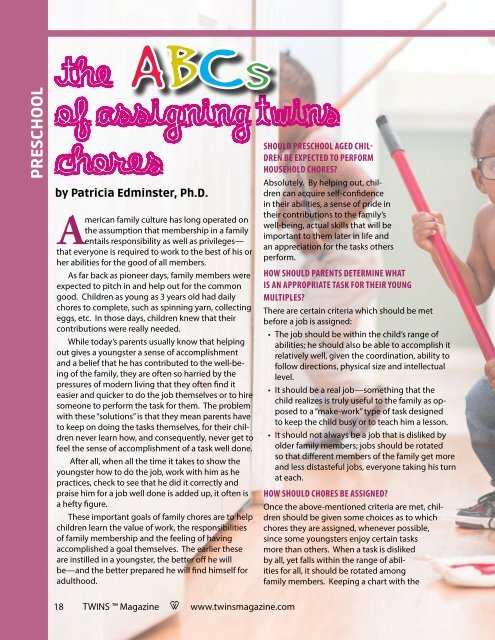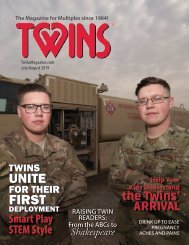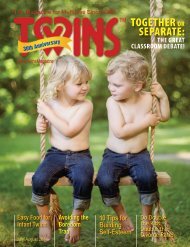SEP OCT 2017 4
Create successful ePaper yourself
Turn your PDF publications into a flip-book with our unique Google optimized e-Paper software.
PRESCHOOL<br />
The<br />
of assigning twins<br />
chores<br />
by Patricia Edminster, Ph.D.<br />
American family culture has long operated on<br />
the assumption that membership in a family<br />
entails responsibility as well as privileges—<br />
that everyone is required to work to the best of his or<br />
her abilities for the good of all members.<br />
As far back as pioneer days, family members were<br />
expected to pitch in and help out for the common<br />
good. Children as young as 3 years old had daily<br />
chores to complete, such as spinning yarn, collecting<br />
eggs, etc. In those days, children knew that their<br />
contributions were really needed.<br />
While today’s parents usually know that helping<br />
out gives a youngster a sense of accomplishment<br />
and a belief that he has contributed to the well-being<br />
of the family, they are often so harried by the<br />
pressures of modern living that they often find it<br />
easier and quicker to do the job themselves or to hire<br />
someone to perform the task for them. The problem<br />
with these “solutions” is that they mean parents have<br />
to keep on doing the tasks themselves, for their children<br />
never learn how, and consequently, never get to<br />
feel the sense of accomplishment of a task well done.<br />
After all, when all the time it takes to show the<br />
youngster how to do the job, work with him as he<br />
practices, check to see that he did it correctly and<br />
praise him for a job well done is added up, it often is<br />
a hefty figure.<br />
These important goals of family chores are to help<br />
children learn the value of work, the responsibilities<br />
of family membership and the feeling of having<br />
accomplished a goal themselves. The earlier these<br />
are instilled in a youngster, the better off he will<br />
be—and the better prepared he will find himself for<br />
adulthood.<br />
Should preschool aged children<br />
be expected to perform<br />
household chores?<br />
Absolutely. By helping out, children<br />
can acquire self-confidence<br />
in their abilities, a sense of pride in<br />
their contributions to the family’s<br />
well-being, actual skills that will be<br />
important to them later in life and<br />
an appreciation for the tasks others<br />
perform.<br />
How should parents determine what<br />
is an appropriate task for their young<br />
multiples?<br />
There are certain criteria which should be met<br />
before a job is assigned:<br />
• The job should be within the child’s range of<br />
abilities; he should also be able to accomplish it<br />
relatively well, given the coordination, ability to<br />
follow directions, physical size and intellectual<br />
level.<br />
• It should be a real job—something that the<br />
child realizes is truly useful to the family as opposed<br />
to a “make-work” type of task designed<br />
to keep the child busy or to teach him a lesson.<br />
• It should not always be a job that is disliked by<br />
older family members; jobs should be rotated<br />
so that different members of the family get more<br />
and less distasteful jobs, everyone taking his turn<br />
at each.<br />
How should chores be assigned?<br />
Once the above-mentioned criteria are met, children<br />
should be given some choices as to which<br />
chores they are assigned, whenever possible,<br />
since some youngsters enjoy certain tasks<br />
more than others. When a task is disliked<br />
by all, yet falls within the range of abilities<br />
for all, it should be rotated among<br />
family members. Keeping a chart with the<br />
18 TWINS Magazine A www.twinsmagazine.com

















